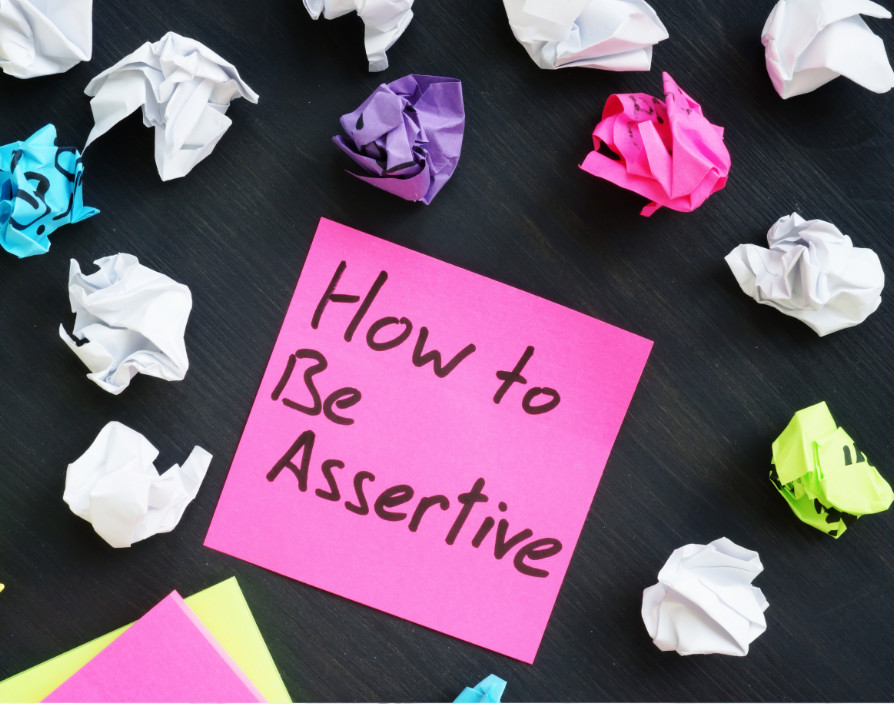Knowing how to be assertive is the secret to powerful communication and the key to getting what we want and deserve. Assertiveness is being prepared to stick your neck out, speak the unspeakable and walk knowingly into conflict. It’s using your mind, body and voice to command the spotlight and confidently stand up for what you believe. It’s about getting comfortable with the whole spectrum of emotions and knowing how to channel them for the common good. Harnessing palatable emotions like love, kindness and compassion, as well as consciously unleashing the more challenging ones like anger, rage and passion. Assertive behaviour is honest, direct, clear, expressive, self-enhancing, persistent and respectful. It’s not about shouting loudly, being overbearing, bossy or pushy (a common misconception) – it’s about knowing where the line is and calling out anyone who crosses it.
When we’re assertive, we fulfil our inner promise and live fully in the world.
What is
assertiveness?
The dictionary definition of assertiveness is ‘a form of behaviour characterised by a confident declaration or affirmation of a statement, without the need for apologising, over-explaining or justifying’, but in reality it’s so much more than that.
If you look at an assertive person, you’ll see they are standing strong, unbowed, posture straight, gestures precise and definitive. If you listen to them speaking, their voice is clear and unwavering, the volume not too loud or too soft, the words accurately conveying their needs, thoughts and wants.
Being assertive means respecting and valuing yourself, while respecting others’ needs and feelings. It means setting your limits in terms of time, energy, privacy and money. It’s about setting boundaries for yourself and others. It doesn’t mean disregarding other people’s limits, freezing with anxiety in the face of someone else’s assertiveness or expecting people to know magically what you want or how you feel. It’s calling out inappropriate behaviour, talking about the elephant in the room and surfacing conversations that people would rather keep under wraps.
An example: I always travel in the quiet carriage when I go by train and one day at 5am, there was a really noisy family next to me. Rather than trying to ignore them I said, “Do you realise you’re in the quiet carriage and everyone in here is either trying to sleep or work? Can you go and sit somewhere else?” They didn’t move but they quietened down. In the past I would have just sat there and seethed, scared of retaliation.
With assertiveness, I was able to express a boundary that, for me, had been crossed and politely ask for what I wanted.
It’s important to be assertive when we need to be. Because ‘nice’
doesn’t get us respected, and certainly doesn’t get us to the top of our game.
Assertiveness isn’t beyond our reach.
Assertiveness is the key to making our wants, needs and views heard. Many assertiveness courses will teach you to use power poses and power words to express yourself. This will take you so far, but it lacks substance. Assertiveness, when expressed in isolation, is a house of cards that can easily be knocked down by a stronger being. To be truly assertive, you need fire in your belly. You need a spark for your potential to be unleashed.
We have all experienced times when we have dearly wanted to communicate our needs and wants and have our value appreciated, but felt incapable of doing so. Why do we find it so hard to be assertive?
What gets
in the way?
Let’s look at some of the obstacles to assertiveness, many of which are linked to development in early years, because understanding what’s stopping us is part of the secret to finding a way through.
- Aversion to being put on the spot: it is rare for adults to put children on the spot and truly pay attention to the answer, so being put in this situation as adults can make us feel like being a rabbit caught in headlights. As a result, there can be mental resistance even when we know we need to speak up.
- Not wanting to cause a scene: thoughts like “I don’t want to make a fuss” hold us back. If someone sitting next to you on a packed train is having a shouty conversation on their phone, do you speak up and ask them to keep it down? Or do you scuttle away and find somewhere quieter to sit? I bet I know the answer.
- Lack of tools: many of us have been taught to be polite. Over polite. Sadly, I’ve found that women in particular don’t have the tools to be assertive because it’s often not a quality that gets taught or encouraged at a younger age. Many of my female clients have compained that when trying to behave assertively, they are either branded bossy or bitchy (labels that would never be attributed to men) or end up having such an overly-emotional reaction that they never do it again.
How
can you develop it?
To tap into your assertiveness, you need to understand who you are and what you want. Assertiveness will then become a life position for you, a superpower that’s forever at your fingertips, as opposed to a technique you need to ‘try out’ in situations when you feel like you ‘need’ to be more assertive.
Start with a clear mind
To be assertive, you need a clear mind. If your views are fuzzy, you will come across as wishy-washy and it will be easier for people to take advantage of you. And if you don’t take yourself seriously, how can you expect other people to?
With clarity, you will feel more confident about expressing yourself and happy to reveal your authentic self to others. You will have a more positive view of your own place in society, be open to other people’s perspectives and welcome them in, even if you disagree.
Clarity comes through understanding your purpose, identity, values and beliefs. These will act as foundation stones that will keep you strong when under pressure, steel your resolve when the going gets tough and lend power to your voice when you want to be heard.
Being assertive with others
Unfortunately, no man – or woman – is an island, and the challenge comes when you have to interact with other people, none of whom will share the same purpose, identity, values and beliefs as you do and all of whom will be equally as wedded to their own ideals as you are to yours!
Although no one and nothing can make you feel anything, the more you know about which people and situations trigger feelings of being threatened, the more you’ll be able to remain in the assertive position and the more powerful you’ll feel.
Once we find our assertiveness mojo, it feels good and will invariably bring a positive outcome. Once you’ve acknowledged your worth and stated it loud and proud, there’s no going back.
Yes, it can be tough. No, it’s not easy to step out of your comfort zone. But the good news is, if you want to do this, you can. So I encourage you to put any bad experiences in the past, be brave, challenge yourself. Because the world is a poorer place if you stay silent.
Share via:


















































